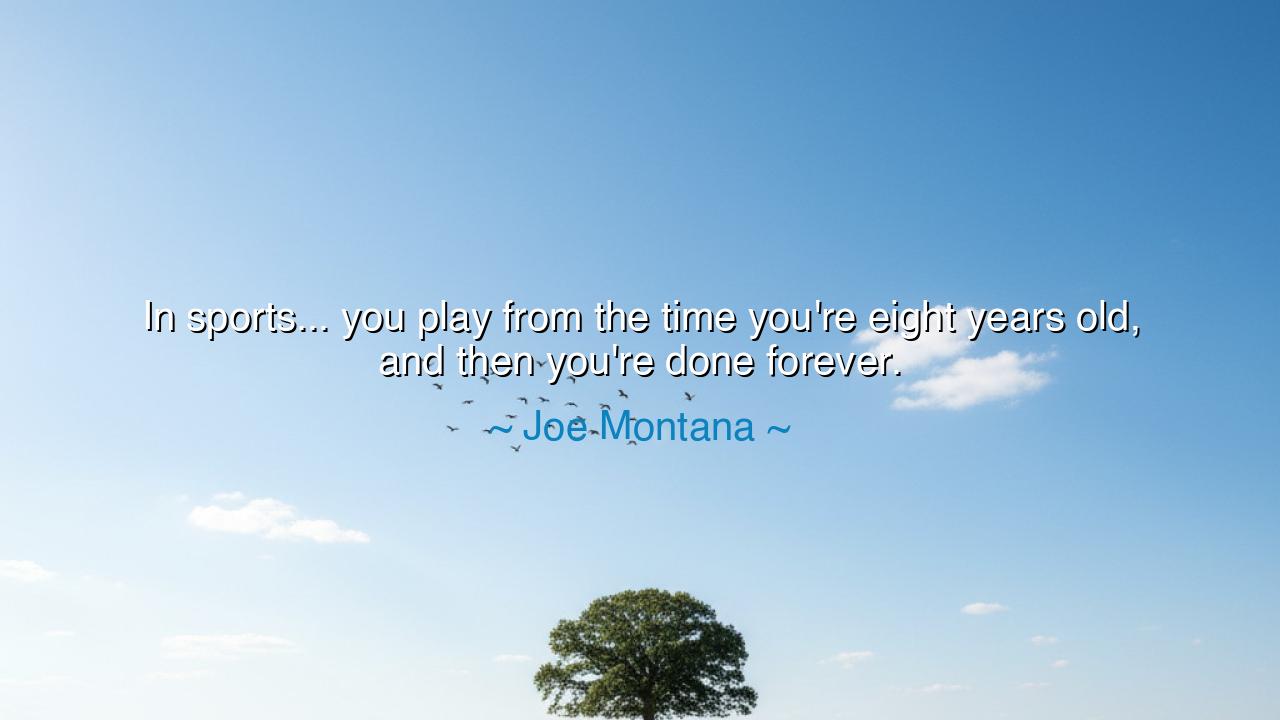
In sports... you play from the time you're eight years old, and
In sports... you play from the time you're eight years old, and then you're done forever.






Joe Montana, the legendary quarterback, once said: “In sports… you play from the time you’re eight years old, and then you’re done forever.” These words echo with a quiet melancholy, yet also with the fire of truth. They are not merely about the end of a career, but about the fleeting nature of glory, the swiftness of youth, and the mortal boundaries placed upon even the greatest champions.
In sports, unlike in many crafts of the mind, the body is both the chariot and the chain. From childhood, the young athlete trains, sacrifices, and gives his whole being to the game. He rises before dawn, sweats when others rest, bleeds when others are safe. Yet, no matter how high he ascends, no matter how strong his will, there comes a time when the body begins to betray him. Reflex slows, strength wanes, and the roar of the crowd grows distant. It is then that the athlete is, as Montana says, “done forever.”
This is the bittersweet fate of the warrior-athlete. The gladiators of Rome knew it, stepping into the arena with the knowledge that their days were numbered. The Olympians of ancient Greece knew it, for their crowns of olive were not eternal but bound to the youth of their limbs. Even the immortal champions of our modern age—be it Muhammad Ali in boxing or Michael Jordan in basketball—were forced to step away, their bodies no longer able to carry the weight of their own greatness.
Montana himself lived this truth. As the field general of the San Francisco 49ers, he orchestrated victories and won championships, yet even he could not outrun time. Injuries mounted, the body grew weary, and the cheers that once lifted him became echoes in memory. His words come not from bitterness but from wisdom: that sports are a fleeting fire, burning brightly, but always destined to fade.
But this quote carries a deeper meaning for all of us. Though the game may end, the lessons endure. The discipline forged in childhood, the courage tested in competition, the resilience learned in defeat—these remain even when the jersey is hung up forever. The field may no longer be theirs, but the spirit of the game continues in their character, their leadership, and the stories they pass down.
Here lies the lesson for you, children of tomorrow: honor your seasons. When you are young, give yourself fully to the pursuit of your passions, for the time will come when that chapter will close. Do not squander your strength in hesitation. But also know this—when the game ends, do not weep for its passing. Instead, carry its wisdom into new arenas, for life has many fields, and the skills of sports—discipline, unity, perseverance—can conquer them all.
Practical actions follow: embrace your present calling with devotion, knowing it will not last forever. Train your body, sharpen your mind, and live your season without regret. But also prepare for the day of transition, when you must shift from playing to guiding, from competing to teaching, from being the warrior on the field to being the sage who shapes the next generation. In this way, you transform the ending into a new beginning.
Thus, when Montana says that in sports you play until you are “done forever,” do not hear only lament. Hear also the reminder that life moves in chapters, and each must be lived with intensity, honor, and gratitude. For though the body fails, the spirit that was forged in those battles lives on—and it is this spirit that makes a man eternal.






AAdministratorAdministrator
Welcome, honored guests. Please leave a comment, we will respond soon